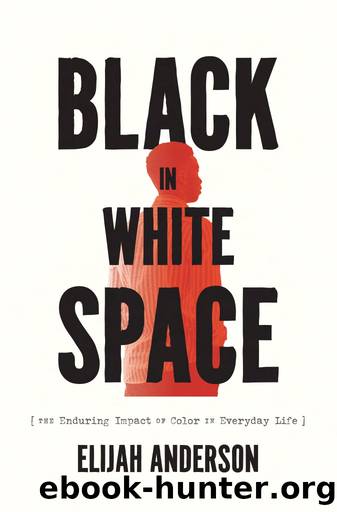Black in White Space by Elijah Anderson

Author:Elijah Anderson [Anderson, Elijah]
Language: eng
Format: epub
Tags: SOC000000 Social Science / General, SOC001000 Social Science / Ethnic Studies / African American Studies, SOC056000 Social Science / Black Studies (global), SOC031000 Social Science / Discrimination & Race Relations, SOC026030 Social Science / Sociology / Urban
Publisher: University of Chicago Press
Published: 2021-01-05T00:00:00+00:00
The Talk
With each negative encounter, local Black men build up antagonism toward law enforcement. They develop defenses and toughen up to protect their pride and perceived respectability. With this built-up hostility, interactions over minor offensesâlike suspicion of selling loose cigarettesâquickly become emotionally charged.5
Typically the ranks of the police include some of the most racially insensitive people in our society. They are often drawn from local blue-collar neighborhoods filled with people who may see themselves and their communities as in fierce competition with Blacks for place and positionâand as losing ground. Many Black police officers Iâve interviewed have expressed this, and some have felt the wrath of their White colleagues. In such circumstances the Black police officersâ role has become extremely difficult; because of their skin color, many have been mistaken for criminals or suspects, and some have been shot by their fellow officers. The police campaign to be tough on crime has brought countless Black deaths owing to over-policing of the Black community.
The recent urban racial turmoil, particularly the Black Lives Matter demonstrations in the summer of 2020 after the killing of George Floyd, reflects the explosive release of a pent-up resentment of this police campaign by Black people and many of their brown and White allies. The motives of some of these allies, particularly those who destroy property, are questionable. They might well take part only to discredit the peaceful demonstrations by well-meaning Blacks. To combat this danger, Black parents often sit their teenage sons and daughters down for a ritual talk that goes something like this: âIf a policeman stops you out on the street, be polite. Donât talk back. Say âYes sir, no sir, Officer. What seems to be the trouble?â Donât make any sudden moves. If youâre driving, donât reach for the glove compartment. If he asks to see your identification, reach for it very carefully; heâll be watching your every move. Let the policeman take the lead. Listen to him. Do as he says. Defer to him. And as soon as youâre able, call me.â
When the police mistreat Black people, arrest them without cause, shoot them, or kill them while making an arrest, as happened to George Floyd in Minneapolis, such incidents become spectacles that may touch off protests around the world. But even more important, they indicate and publicize the lowly place of Black citizens in American society and culture, especially the role of the iconic ghetto in defining Blacks as a separate, lower caste, undermining their moral authority in the minds of their fellow citizens.
Moreover, many Whites have not adjusted to the idea that Black people now occupy more positions of privilege, power, and prestigeâor just appear in places where they were historically unwelcome. When they see Blacks in such places, many Whites, though not all, unconsciously or explicitly want to banish them to the iconic ghettoâto the stereotypical space where they think all Black people belong, a segregated space for second-class citizens. Not courageous enough to attempt this feat alone, many of
Download
This site does not store any files on its server. We only index and link to content provided by other sites. Please contact the content providers to delete copyright contents if any and email us, we'll remove relevant links or contents immediately.
Cecilia; Or, Memoirs of an Heiress — Volume 1 by Fanny Burney(31448)
Cecilia; Or, Memoirs of an Heiress — Volume 3 by Fanny Burney(31039)
Cecilia; Or, Memoirs of an Heiress — Volume 2 by Fanny Burney(30986)
The Great Music City by Andrea Baker(23149)
We're Going to Need More Wine by Gabrielle Union(18128)
Bombshells: Glamour Girls of a Lifetime by Sullivan Steve(13160)
Pimp by Iceberg Slim(13004)
All the Missing Girls by Megan Miranda(12843)
Fifty Shades Freed by E L James(12492)
Talking to Strangers by Malcolm Gladwell(11993)
Norse Mythology by Gaiman Neil(11966)
Crazy Rich Asians by Kevin Kwan(8414)
Mindhunter: Inside the FBI's Elite Serial Crime Unit by John E. Douglas & Mark Olshaker(7904)
The Lost Art of Listening by Michael P. Nichols(6537)
Enlightenment Now: The Case for Reason, Science, Humanism, and Progress by Steven Pinker(6450)
Bad Blood by John Carreyrou(5816)
The Four Agreements by Don Miguel Ruiz(5578)
Weapons of Math Destruction by Cathy O'Neil(5099)
We Need to Talk by Celeste Headlee(4924)
